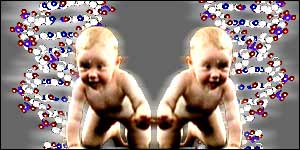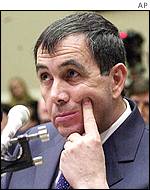
US politicans criticise human cloning efforts
URL: http://news.bbc.co.uk/hi/english/sci/tech/newsid_1247000/1247368.stm
Date accessed: 3 April 2001
Thursday, 29 March, 2001, 11:35 GMT 12:35 UK
We have no intention to step over dead bodies or deformed babies to
accomplish this [cloning]
|
|
Prof Panos Zavos
|
Both the doctor and the group said they would forge ahead with their controversial plans to produce "carbon copy" children.
Panos Zavos, professor of reproductive physiology at the University of Kentucky, has already announced that he intends to try to clone humans within the next 12 months.
Stronger powers
"We have no intention to step over dead bodies or deformed babies to accomplish this," Professor Zavos told the investigations subcommittee of the House Energy and Commerce Committee.

Dr Brigitte Boisselier: Advising Clonaid
|
An official from the US regulatory authority, the Food and Drug Administration, said the agency currently could deny permission for human cloning experiments only on safety grounds.
Violators could face fines of up to $100,000 (£69,390) and a year in prison. Lawmakers said they supported giving the government stronger powers.
Dr Brigitte Boisselier, director of Clonaid, a cloning programme backed by a religious sect, also testified before the subcommittee.
Clonaid is an arm of the Raelian Movement, a group that claims to be the world's largest UFO-related organisation. Clonaid wants to clone a couple's dead child at a secret US lab.
Underdeveloped technology
Efforts to clone human beings are facing mounting criticism, from religious groups, scientists and politicians.

Panos Zavos: Claims to be able to screen faulty embryo clones
|
In a letter to the journal Science, Ian Wilmut, one of the scientists who produced Dolly the Sheep, the first adult mammalian clone, and US colleague Rudolf Jaenisch, said attempts to clone human beings at the current time were "dangerous and irresponsible".
However, despite these concerns, few laws exist to stop anyone wanting to clone a human from doing so.
Only four US states, and 12 nations worldwide, have banned human cloning.
Category: 33. Cloning